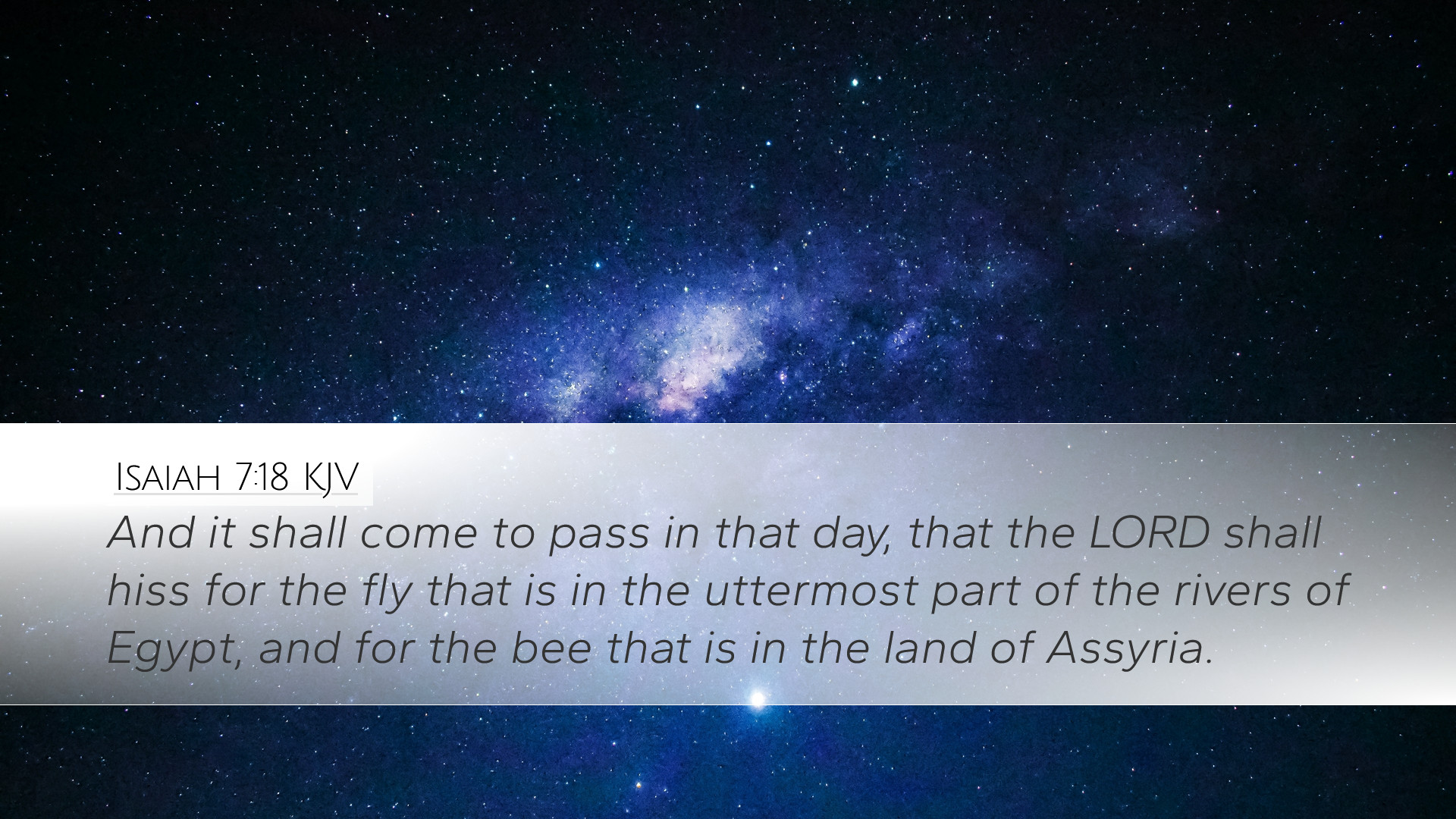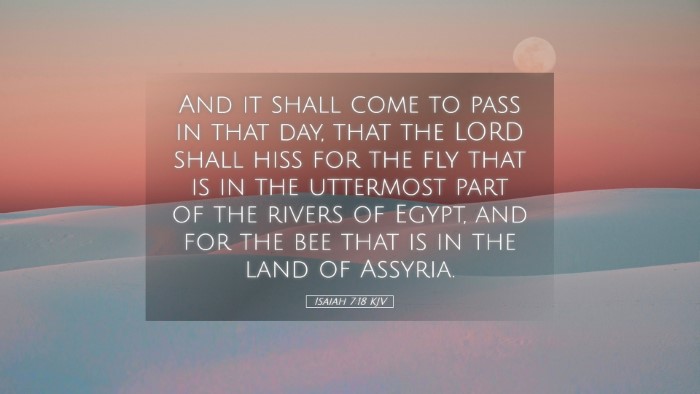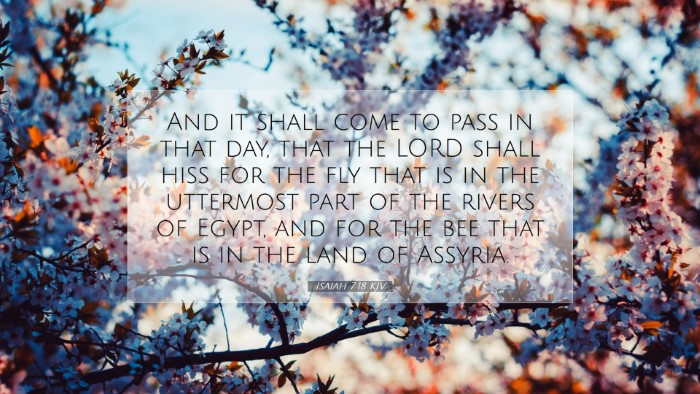Commentary on Isaiah 7:18
The verse Isaiah 7:18 states:
"And it shall come to pass in that day, that the Lord shall hiss for the fly that is in the uttermost part of the rivers of Egypt, and for the bee that is in the land of Assyria."
Introduction
This passage from the book of Isaiah is rich in symbolic meaning and prophetic significance. Isaiah, a prophet during a turbulent time in Judah’s history, delivers a message that addresses both immediate and distant futures. This commentary combines insights from various public domain commentary sources to unpack the layers of this verse comprehensively.
Contextual Background
Isaiah prophesies during the reign of Ahaz, who faced mounting pressure from the neighboring kingdoms of Israel (Ephraim) and Syria. The overarching theme in Isaiah's prophecy is the reassurance of God's sovereignty and the inevitable triumph of His purposes despite human despair.
The Significance of "That Day"
Matthew Henry observes that the phrase "that day" frequently appears in prophetic literature to denote a time of divine intervention. In this case, it indicates a period of reckoning where God acts decisively on behalf of His people.
- Covenantal Context: The promise made to the house of David is at the heart of this prophecy (see Isaiah 7:14, which speaks of Immanuel). This assurance embodies the continuity of God's covenantal faithfulness, foreshadowing the ultimate fulfillment in Christ.
- Judicial Action: Albert Barnes highlights the judicial nature of God's actions—in this context, God is depicted as summoning His agents, represented by the fly and the bee, as instruments of judgment and deliverance.
Symbolic Interpretation of the Insects
In this verse, two specific creatures are invoked: the fly and the bee. Each holds significant symbolic weight, which can be explored from both a natural and a theological perspective.
The Fly
Henry interprets the fly as an emblem of judgment. Flies often symbolize death and decay—an evocative image for the Assyrian threat as a means of judgment against the unfaithfulness of Israel. In Egyptian culture, the fly holds various associations with pestilence and annoyance, indicating God's control over even the most trivial annoyances.
The Bee
Conversely, Clarke points out that bees typically signify industriousness and community, but they can also represent aggression when provoked. Here, the bee from Assyria signifies the swarming, aggressive military might that God would invoke against Judah's enemies.
Geographical and Political Implications
The geographical references in this verse also carry deep implications. Egypt and Assyria were pivotal powers in Isaiah's time, each representing different threats and symbols of neighboring power dynamics.
- Egypt: Often depicted in a dual light in Israel's scriptures, Egypt is both a land of refuge and bondage. By calling upon the fly 'from the uttermost part of the rivers of Egypt', Isaiah demonstrates God's sovereignty over nations that Israel both fears and relies upon.
- Assyria: Symbolizing imminent threat, Assyria is depicted as a buzzing swarm, illustrating the overwhelming nature of its military. Here, God's ability to command these powers underlines His ultimate authority over all nations.
Theological Reflections
This passage also evokes a rich theological reflection on the nature of God’s providence and the means by which He acts in history.
God’s Sovereignty
Albert Barnes emphasizes the theme of divine sovereignty in this scripture. God, in His omnipotence, has the authority to summon even the smallest creatures to achieve His grand purposes. This affirms a theological understanding that no aspect of creation is outside His dominion.
God's Instrumental Means
Clarke reflects on how God uses the circumstances around Israel for His plans. The insects, representing seemingly inconsequential details, become instruments in His larger plan. This signals a broader lesson in faith for the faithful; God uses all creation to execute His will, no matter how unusual.
- Instruments of Judgment: Just as Assyria serves as a tool for God's correction, believers are reminded that God’s hand can work through what appears perilous to fulfill His redemptive purposes.
- Divine Deliverance: Further, the mention of these creatures points not solely to impending judgment but also to God’s ultimate deliverance; He controls destinies and will protect His faithful remnant.
Conclusion
Isaiah 7:18 provides deep insight into God's sovereignty and His intricate workings within the world. Through the symbolic use of the fly and the bee, this verse calls believers to recognize God's reigning power over all aspects of life, both judgmental and redemptive.
In a contemporary context, this passage serves as a powerful reminder for pastors, students, theologians, and scholars that amidst chaos and uncertainty, God remains in control, orchestrating all events according to His divine plan.


